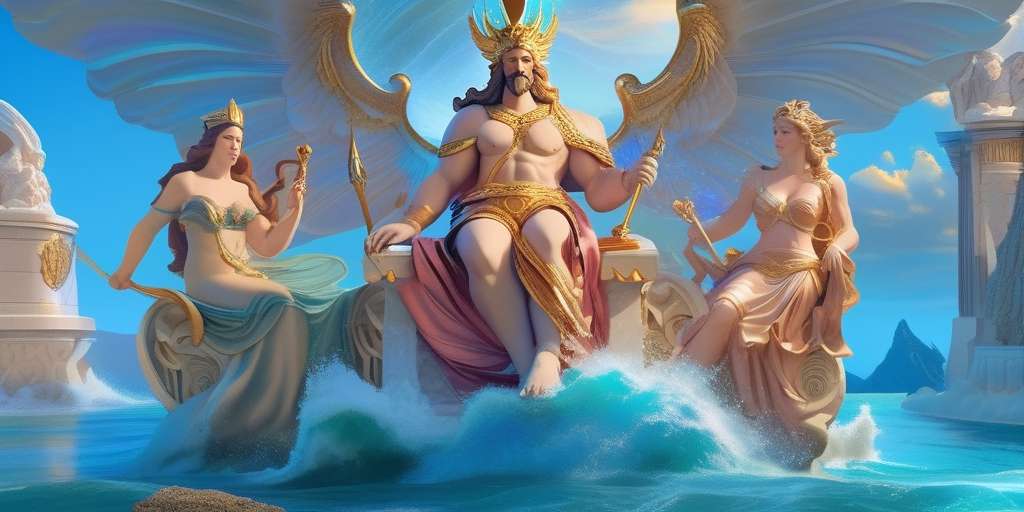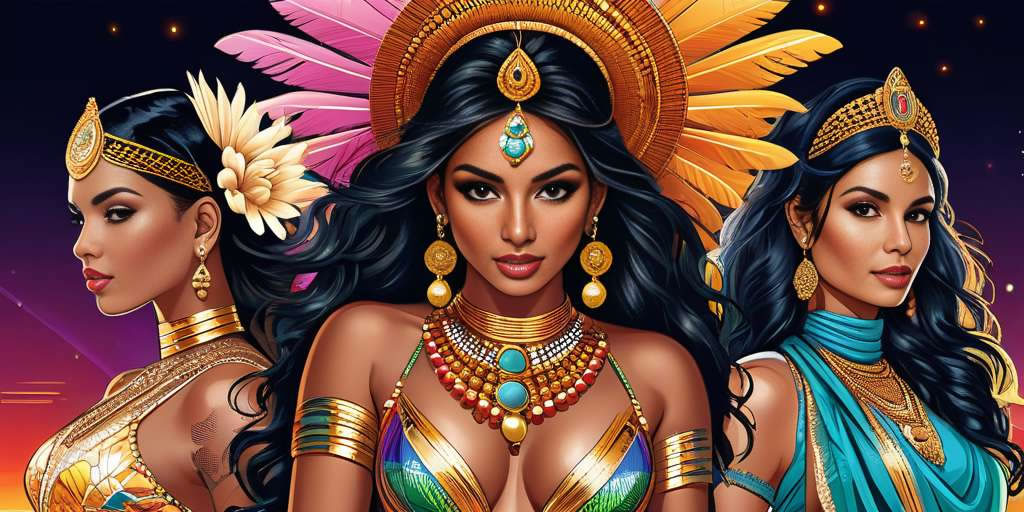Greek mythology is full of fascinating names of gods , each with its own meaning and relevance. Among them are the twelve Olympians, such as Zeus , Hera , Aphrodite and Apollo Below we will explore more details about these names and their importance in ancient Greece
The Greek gods and their importance in mythology
Greek mythology transports us to a world of gods and goddesses with striking names and deep meanings. These divine beings occupy a central place in the ancient culture of Greece, being a topic of great relevance in its mythology.
Origin and meaning of the Greek names of gods
The Greek names of gods have their origin in ancient Greece and are a fundamental part of their mythology. These names, many of which are still used today, have meanings that reflect the characteristics and attributes of each particular deity.
- Zeus : Zeus’s name means ‘shine’ or ‘sky’ in Greek, reflecting his position as the king of the gods and lord of Mount Olympus.
- Hera : The name Hera is derived from the Greek word ‘hera’, which means ‘earth’ or ‘lady’. As the goddess of marriage and protector of women, her name reflects her importance in Greek society.
- Poseidon : Poseidon’s name comes from ‘poseidao’, which means ‘he who shakes the earth’. As god of the seas and earthquakes, his name evokes his power and dominion over these natural forces.
The relevance of the Olympic gods in ancient Greece
Among the numerous gods and goddesses of Greek mythology, the Olympian gods occupied a central place in ancient Greece. These twelve gods, known as the Olympians, resided on Mount Olympus and were worshiped and revered by the Greeks.
- Zeus : As king of the gods and leader of the Olympian pantheon, Zeus played a fundamental role in Greek mythology, being the god of thunder and lightning.
- Hera : As the goddess of marriage and protector of women, Hera had a significant influence on the daily lives of the Greeks.
- Poseidon : The powerful god of the seas and earthquakes, Poseidon was revered and feared alike.
- Aphrodite : The goddess of love and beauty, Aphrodite awakened passions and emotions in the hearts of mortals and gods alike.
- Ares : As the god of war and violence, Ares represented ferocity and bravery in battle.
- Apollo : The god of music, poetry and prophecy, Apollo was worshiped as the patron of the arts and wisdom.
The Twelve Olympians: the main gods of the Greek pantheon
The twelve Olympians are the most important and powerful gods in the Greek pantheon. Each of them has its own domain and distinctive characteristics, being worshiped and venerated by the ancient Greeks. Get to know some of these outstanding gods and goddesses below:
Zeus, king of the gods and lord of Mount Olympus
Zeus is the supreme god of the Greek pantheon and ruler of Mount Olympus. He is known for his might and leadership, considered as the father of all gods and men. Zeus represents the sky and thunder, and his imposing figure makes him one of the most revered deities in ancient Greece.
Hera, the goddess of marriage and protector of women
Hera is the wife and sister of Zeus, being the goddess of marriage and fertility. Her power and beauty are combined with her role as protector of married women. Hera is described as a jealous goddess, but she is also an important figure in Greek mythology, including being one of the most important Olympian goddesses.
Poseidon, the god of the seas and earthquakes
Poseidon is the god who rules the seas and oceans, known for his impetuous temper. His trident and his relationship with earthquakes give him great power over natural forces. He is also considered the protector of navigators and sailors, being widely worshiped in ancient Greece.
Aphrodite, the goddess of love and beauty
Aphrodite is the goddess of love, beauty and sensuality. She represents passion and desire, being worshiped for her ability to awaken and control loving feelings in human beings. The figure of her is synonymous with absolute beauty and she has played a significant role in the mythology and beliefs of ancient Greece.
Ares, the god of war and violence
Ares personifies the brutality and chaos of war. He is the god of violence and destruction, being feared for his ferocity on the battlefield. Although he is not one of the most beloved or worshiped gods, his role in Greek mythology makes him one of the twelve key Olympians in the pantheon.
Apollo, the god of music, poetry and prophecy
Apollo is the god of arts, music, poetry and prophecy. His figure is associated with beauty and harmony, and is considered a source of inspiration for artists and poets. In addition to his artistic gifts, Apollo also has the gift of prophecy and is related to the sun and light.
These are just a few examples of the twelve Olympians, but there are many more gods and goddesses that make up the fascinating Greek pantheon. Each of them has their own role and relevance in mythology, leaving a lasting legacy in Greek culture and history.
Other gods and goddesses of Greek mythology
In Greek mythology, in addition to the twelve Olympians, there are other gods and goddesses who occupy a prominent place in the Greek pantheon and play important roles in stories and legends. Below, we will explore three of them: Hades, Dionysus and Persephone.
Hades, the god of the underworld and ruler of the kingdom of the dead
Hades, also known as Pluto, is the brother of Zeus and Poseidon. He is in charge of ruling the underworld, the place where the souls of the dead go. He is often depicted as a serious and somber man, wearing a helmet that makes him invisible. In addition to his important role as god of the underworld, Hades is also known for his wealth and his ability to enrich himself with precious minerals and metals.
Dionysus, the god of wine, party and ecstasy
Dionysus, also called Bacchus, is the god of wine, celebration and ecstasy. He is credited with the invention of viticulture and wine production. Dionysus is depicted as a young and joyful god, often surrounded by followers and wherever he goes, he brings celebration and joy. The figure of him is associated with ecstasy and the release of inhibitions, symbolizing the exaltation of feelings and emotions.
Persephone, goddess of the underworld and wife of Hades
Persephone, also known as Proserpina, is the daughter of Zeus and Demeter, and is known as the goddess of the underworld and queen of the kingdom of the dead. She is a dual figure, as she spends part of the year in the underworld with her husband Hades and the other part on Earth, when spring arrives. Persephone plays an important role in the cycles of nature, as her departure to the underworld marks the beginning of winter and her return brings with it the arrival of spring and the rebirth of life.
Greek names of gods and their popularity today
Use of Greek names in contemporary culture
The Greek names of gods have transcended the confines of mythology and have become an important part of contemporary culture. These names have found their place in various areas such as literature, cinema, video games and even in people’s names.
In literature, it is common to find characters with names like Zeus, Hermes, Athena or Aphrodite. These names evoke strength, wisdom, beauty and other qualities associated with the Greek gods. In addition, they are used as cultural references that enrich the stories and create a unique mythological atmosphere.
We cannot fail to mention the seventh art, cinema, where the Greek gods have been portrayed in numerous films and sagas. These names, such as Hades, Poseidon or Apollo, have been used to give life to characters with divine powers and characteristics associated with their mythological counterpart. This has contributed to keeping alive the importance and interest in Greek culture.
Video games have also adopted names of Greek gods for their characters. In role-playing and fantasy games, names such as Artemis, Dionysus, or Ares are used to represent deities who grant players powers and abilities. This creates a connection to ancient mythology and adds a layer of depth and mysticism to the gaming experience.
Meaning and symbolism of the Greek names of gods
- Hermes: This name means ‘messenger’. Hermes, the messenger god, symbolizes communication and speed.
- Athena: Its meaning is ‘wisdom’. Athena represents intelligence, strategy and justice.
- Ares: This name means ‘war’. Ares personifies violence and strength in battle.
- Sagebrush: Its meaning is ‘wild’ or ‘intact’. Artemis is the goddess of hunting and virgin nature.
- Aphrodite: This name means ‘sea foam’. Aphrodite is the goddess of love and beauty.
The names of the Greek gods have deep symbolism and are loaded with meaning. Each name represents a specific quality or aspect of the deity, allowing for a richer and more complete representation of the deity’s personality and attributes.
The Greek names of gods continue to be used in contemporary culture, demonstrating their relevance and durability over time. Its popularity has not diminished, but has transcended the boundaries of mythology and has become an integral part of our society today, enriching our stories and creating a connection with the Greek past. For more information on Greek mythology and names of gods, you can consult the following references: – Reference 1 – Reference 2
Frequently asked questions about Greek names of gods
If you are interested in learning more about the Greek names of gods, here you will find answers to some frequently asked questions on the subject.
How many Olympian gods are there in Greek mythology?
In Greek mythology, the Olympian gods are a group of twelve main gods who resided on Mount Olympus. These gods were considered the most powerful and ruled over different aspects of human life and the universe. Some of the best-known Olympian gods are Zeus, Hera, Poseidon, Aphrodite, Ares and Apollo.
What is the origin of the Greek names of gods?
The Greek names of gods have their origin in ancient Greece, where they were worshiped and revered as deities. These names are linked to mythology and stories about Greek gods and goddesses. Many of these names have meanings related to the characteristics and attributes of the gods they represent.
Who are some notable gods and goddesses outside of the Olympian twelve?
In addition to the twelve Olympians, Greek mythology has other gods and goddesses of great relevance. One of them is Hades, the god of the underworld and ruler of the kingdom of the dead. Dionysus is another important god, being the god of wine, partying and ecstasy. We also find Persephone, goddess of the underworld and wife of Hades.
What is the importance of the Olympian gods in Greek culture?
The Olympian gods play a fundamental role in Greek culture. They were worshiped and venerated through rituals and cults, and were believed to have direct influence on events and people’s daily lives. These gods represented different aspects of human existence and were considered intermediaries between human beings and divine forces.









